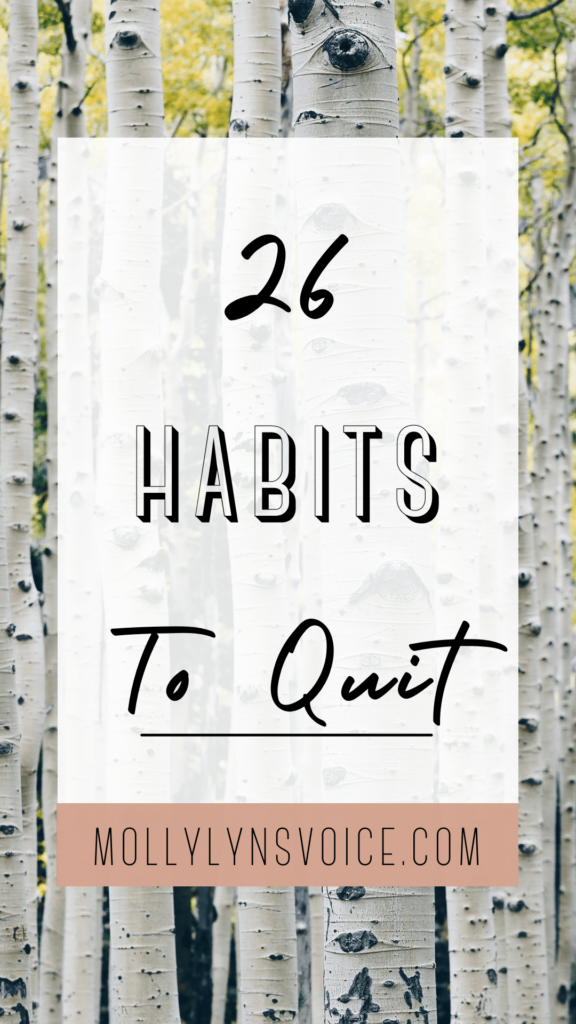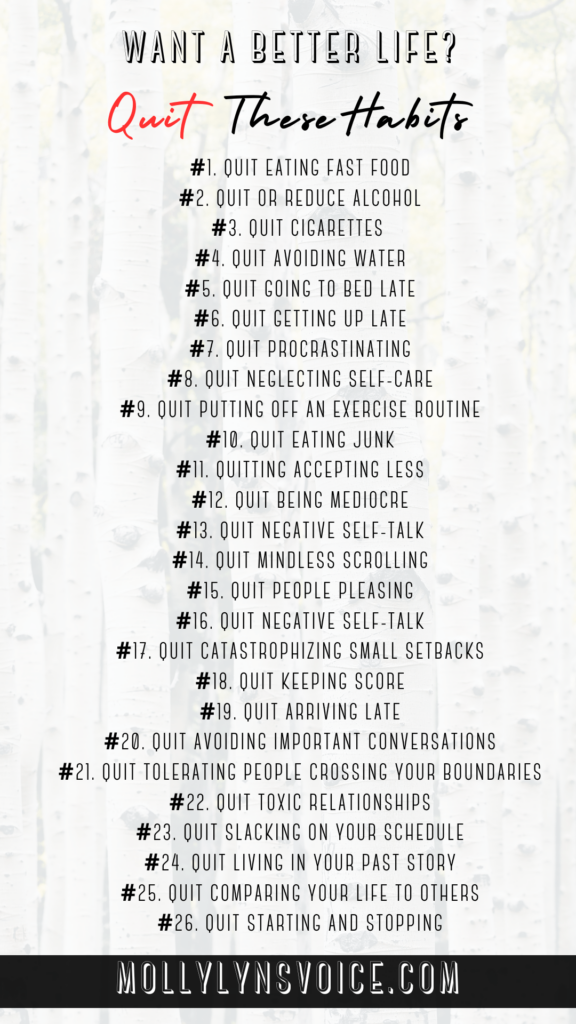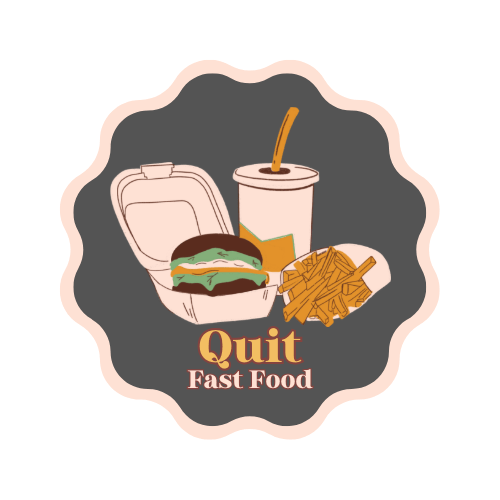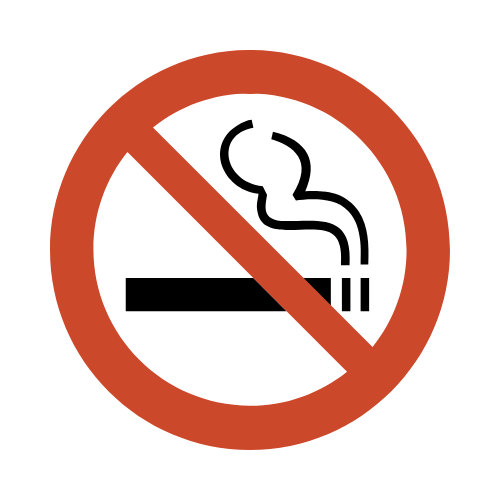Why Quitting Bad Habits Is the Real Key to Personal Transformation
We all have some bad habits to quit. We often want to negate why we have them and jump to the new ones not realizing the stronghold the bad habits still have on our life. For me personally in order to quit bad habits I have to ask God for help, I ask Him to take my burdens and give me a new mind to focus on a better life.
I struggled with this for years and finally figured out I needed to look hard in the mirror and confront the roots of my bad habits to truly quit them. If I could focus on understanding why I engage in negative patterns, I discovered I had a much better chance of breaking free from them permanently.
Putting Off the Old Self: “To put off your old self, which belongs to your former manner of life and is corrupt through deceitful desires, and to be renewed in the spirit of your minds, and to put on the new self, created after the likeness of God in true righteousness and holiness.” -Ephesians 4:22-24
God knows are our hearts. What matters is who we are on the inside, and living with light from the inside shines on our outside. What I am getting at is that God sees everything, we cannot hide anything from him. Our habits are representation of who we are! Are your habits representing the likeness of God? It will shine on the outside if so 🙂
How Quitting Bad Habits Transforms Your Life Immediately
When I talk about “instantly” improving your life by quitting bad habits, I’m referring to the immediate impact on self-development. When you prioritize your well-being by eliminating harmful behaviors, you begin cultivating a confident relationship with yourself. I can personally attest to this transformation.
In the past, I frequently made promises to myself that I wouldn’t keep, creating a cycle of self-disappointment. This pattern was particularly damaging because:
- I lost trust in myself with each broken commitment
- I damaged relationships when others noticed my pattern of unfulfilled promises
- My self-confidence and self-love steadily declined
This negative cycle created a foundation of distrust—I couldn’t trust myself, and others couldn’t trust me either. What a devastating way to undermine your self-worth and confidence. It was time for me to work on becoming someone of integrity, someone I was proud to be.
Breaking the Cycle: Identifying Your Harmful Patterns
The first step toward lasting change isn’t adopting new positive habits—it’s honestly examining the negative ones holding you back. By understanding the triggers, emotional payoffs, and underlying causes of your bad habits, you create the self-awareness necessary for genuine transformation.
When you commit to addressing these root causes, you don’t just eliminate the negative behavior—you heal the underlying need that created it in the first place.
Building Self-Trust Through Habit Change
The journey of quitting bad habits rebuilds your relationship with yourself one small victory at a time. Each day you follow through on your commitment to change, you deposit a little more trust into your self-relationship account.
Over time, this consistent follow-through creates a powerful foundation of self-respect that naturally extends to other areas of your life. Making the best decisions for your future becomes more and more natural.
Here they are:
26 Habits to Quit for a Better Life Instantly
Here are the 26 Habits to Quit & Why
#1. Quit Eating Fast Food
Quitting fast food can change your life for the better in several crucial ways:
Physical Health Benefits:
- Improved energy levels as your body receives more nutrient-dense foods
- Better weight management from reduced calorie, fat, and sodium intake
- Decreased risk of chronic conditions like heart disease, type 2 diabetes, and hypertension
- Clearer skin as you reduce intake of processed ingredients and inflammatory foods
- Better digestive health from increased fiber and reduced artificial ingredients
Mental and Emotional Improvements:
- Enhanced mood stability from steadier blood sugar levels
- Increased mental clarity and focus from better nutrition
- Greater self-confidence from making consistent healthy choices
- Reduced anxiety related to unhealthy eating patterns
- Better sleep quality from improved nutrition
Practical Advantages:
- Financial savings (home-prepared meals are typically more economical)
- Development of cooking skills and food knowledge
- More mindful eating habits and connection to your food
- Setting a positive example for friends and family
- Discovering new flavors and foods you enjoy
Many people report noticing tangible benefits within just 1-2 weeks of reducing fast food consumption. You don’t need to quit completely at once – even gradually reducing frequency can lead to significant improvements in how you feel.
#2. Quit or Reduce Alcohol
Quitting alcohol can create profound positive changes in many aspects of your life:
Physical Health Benefits:
- Improved sleep quality and patterns
- Enhanced immune system function
- Better liver health and function
- Reduced inflammation throughout your body
- Lower blood pressure and reduced heart disease risk
- Weight management becomes easier
- Clearer skin and reduced facial puffiness
- More stable blood sugar levels
Mental & Emotional Improvements:
- Greater mental clarity and sharper cognitive function
- Reduced anxiety and more stable mood
- Improved ability to manage stress effectively
- Better memory formation and retention
- Reduced risk of depression
- More consistent energy levels throughout the day
- Greater sense of emotional resilience
Practical Life Changes:
- More productive mornings without hangovers
- Financial savings (alcohol expenses add up quickly)
- More authentic social connections
- More free time that was previously spent drinking or recovering
- Improved performance at work or school
- Better decision-making in all areas of life
- Potential improvements in relationships
Many people notice some benefits within days (better sleep, more energy), while other improvements continue to develop over weeks and months. The psychological freedom from dependency and the pride in making a positive change are also significant benefits many former drinkers report. Not to mention the thousands of dollars you will save!
#3. Quit Cigarettes
Quitting cigarettes can improve your life in numerous significant ways:
Health Benefits (Short-term):
- Within 20 minutes: Your heart rate and blood pressure drop
- Within 12 hours: Carbon monoxide levels in your blood return to normal
- Within 2 weeks to 3 months: Your circulation improves and lung function increases
- Within 1 to 9 months: Coughing and shortness of breath decrease; lungs begin to clear
- Improved sense of taste and smell
- Better dental health with reduced staining and fresher breath
Health Benefits (Long-term):
- Significantly reduced risk of lung cancer, heart disease, stroke, and respiratory diseases
- Decreased risk of many other cancers (bladder, esophageal, kidney, etc.)
- Lower risk of diabetes and improved control if you have diabetes
- Stronger immune system
- Reduced risk of osteoporosis and improved bone health
- Longer life expectancy (quitting at age 30 adds nearly 10 years to life expectancy)
Quality of Life Improvements:
- More energy for daily activities and exercise
- Elimination of smoker’s cough and respiratory infections
- No more smoke odor on your clothes, hair, home, and car
- Freedom from planning activities around smoking breaks
- Relief from the stress of hiding smoking or finding places to smoke
- Better endurance and physical performance
Financial Benefits:
- Immediate savings from not buying cigarettes (often thousands per year)
- Lower health insurance premiums
- Reduced healthcare costs over time
- Less money spent on breath fresheners, teeth whitening, etc.
Social and Emotional Benefits:
- Reduced anxiety and depression (despite the common misconception that smoking relieves stress)
- Increased self-confidence from overcoming addiction
- Setting a positive example for others, especially children
- Freedom from stigma associated with smoking
- Improved relationships with non-smoking friends and family
Many former smokers report that the psychological freedom from addiction is one of the most rewarding aspects of quitting, along with the pride that comes from overcoming such a challenging habit.
#4. Quit Avoiding Water
Increasing your water intake after avoiding it can lead to remarkable health benefits in your daily life:
Physical Benefits:
- More consistent energy levels throughout the day
- Reduction in headaches, which are often caused by dehydration
- Improved digestion and reduced constipation
- Better kidney function and reduced risk of kidney stones
- Clearer, more hydrated skin with improved elasticity
- Reduced joint pain as cartilage stays better lubricated
- Improved exercise performance and recovery
- Better temperature regulation, especially in hot weather
Cognitive Improvements:
- Enhanced mental clarity and focus
- Improved concentration during tasks
- Better mood stability and reduced irritability
- Potential reduction in brain fog
Daily Quality of Life:
- Reduced feelings of fatigue and lethargy
- Better mouth health and fresher breath
- Less intense hunger (thirst is often mistaken for hunger)
- Improved sleep quality
- Fewer muscle cramps, particularly at night
- Stronger immune system response
Long-term Health Benefits:
- Better cardiovascular health as proper hydration supports heart function
- Reduced risk of certain types of cancer
- Support for healthy weight management
- Better blood pressure regulation
- Improved blood oxygen circulation
Many people notice some benefits like increased energy and reduced headaches within just 1-2 days of proper hydration. Other benefits develop more gradually as your body adjusts to having adequate water consistently.
The transition to drinking more water is one of the simplest yet most impactful health changes you can make, with benefits that affect virtually every system in your body.
#5. Quit Going to Bed Late
Establishing an earlier bedtime can create remarkable improvements in many aspects of your life:
Physical Benefits:
- More complete sleep cycles, enhancing overall sleep quality
- Better hormone regulation (including growth hormone and cortisol)
- Improved immune system function
- Increased physical energy throughout the day
- Better appetite regulation and metabolism
- Reduced inflammation throughout the body
- Lower risk of cardiovascular issues linked to sleep deprivation
Mental and Cognitive Advantages:
- Enhanced focus and concentration during the day
- Improved memory formation and retention
- Better emotional regulation and stress management
- Reduced anxiety and depressive symptoms
- Sharper decision-making abilities
- Greater creativity and problem-solving skills
- More stable mood throughout the day
Productivity and Performance:
- More productive morning hours when many people do their best work
- Reduced procrastination and improved time management
- Better performance at work or school
- More consistent energy for exercise and physical activities
- Reduced reliance on caffeine and other stimulants
Quality of Life Improvements:
- More time to establish a relaxing evening routine
- Reduced feeling of always rushing or being behind
- Better alignment with natural circadian rhythms
- More predictable daily schedule
- Opportunity to enjoy peaceful morning hours
- Potential for more quality time with early-rising family members
Many people report noticeable benefits within just a few days of shifting to an earlier, consistent bedtime. The cumulative effects of quality sleep become even more significant over weeks and months, potentially transforming your overall well-being and daily experience.
#6. Quit Getting Up Late
Waking up earlier can transform your daily life in numerous positive ways:
Morning Advantages:
- Gain peaceful, uninterrupted time for yourself before daily demands begin
- Enjoy a relaxed morning routine instead of rushing
- Have time for a proper breakfast, improving nutrition and metabolism
- Reduced morning stress and anxiety from not hurrying
- Time for exercise when willpower is typically strongest
- Opportunity for thoughtful planning of your day
Productivity Benefits:
- Access to your peak cognitive hours when your mind is freshest
- More uninterrupted focus time before meetings and communications begin
- Improved consistency in daily routines
- Potential for completing important tasks before most people start their day
- Better alignment with business hours for appointments and services
- More daylight hours at your disposal
Physical and Mental Wellbeing:
- Better alignment with your natural circadian rhythms
- Increased exposure to morning sunlight, improving mood and vitamin D production
- More consistent sleep-wake cycles, improving overall sleep quality
- Reduced likelihood of sleep inertia (that groggy feeling from waking rushed)
- Often leads to earlier bedtimes, creating healthier sleep patterns
- Enhanced mental clarity and alertness throughout the day
Lifestyle Improvements:
- More time to enjoy daylight, especially in winter months
- Opportunities for morning activities like watching the sunrise
- Sense of accomplishment early in the day that carries forward
- Potential for more family time in the mornings
- Less likely to miss appointments or be late for commitments
- Greater sense of control over your day rather than the day controlling you
Many early risers report that the morning hours feel like “bonus time” – productive, peaceful hours they never experienced when sleeping in. Even shifting your wake time by 30-60 minutes earlier can create noticeable improvements in your daily experience.
#7. Quit Procrastinating
Overcoming procrastination can transform your life in powerful ways:
Reduced Stress and Anxiety:
- Eliminate the constant weight of unfinished tasks hanging over you
- Free yourself from last-minute panic and rushed work
- Experience the relief of having buffer time for unexpected challenges
- Enjoy the peace of mind that comes with staying ahead of deadlines
Improved Work Quality:
- Give yourself time for revision and refinement
- Incorporate feedback and make improvements
- Apply your best thinking rather than rushed efforts
- Complete work you can genuinely be proud of
Enhanced Productivity:
- Accomplish more with the same amount of time
- Build momentum that makes starting new tasks easier
- Break large projects into manageable pieces
- Experience the satisfaction of steady progress
Better Relationships:
- Become known as reliable and dependable
- Reduce conflicts caused by missed deadlines or commitments
- Have more energy for meaningful connections when not stressed by procrastination
- Be more present with others instead of worried about postponed tasks
Personal Growth:
- Develop stronger self-discipline that benefits all areas of life
- Build genuine confidence from consistently meeting commitments
- Experience increased self-respect and trust in yourself
- Create a positive cycle of achievement and motivation
Time Freedom:
- Create genuine leisure time unmarred by guilt or anxiety
- Enjoy breaks without the shadow of unfinished work
- Have more control over your schedule
- Experience life with greater presence rather than constant worry about what’s not done
The shift away from procrastination often starts small but creates a snowball effect of positive changes that can ultimately transform your relationship with time, work, and yourself.
#8. Quit Neglecting Self-Care
Prioritizing self-care can transform your life in profound ways:
Physical Wellbeing:
- Increased energy and vitality for daily activities
- Better sleep quality and more consistent rest
- Stronger immune system and fewer illnesses
- Improved physical appearance reflecting inner health
- Better management of existing health conditions
- Reduced physical tension and pain
- More stable weight and improved nutrition
Mental and Emotional Health:
- Significant reduction in stress and anxiety levels
- Greater emotional resilience during challenging times
- Improved mood stability throughout the day
- Enhanced ability to process difficult emotions
- Sharper focus and mental clarity
- Better memory and cognitive function
- Reduced risk of burnout and mental exhaustion
Relationships and Social Life:
- More authentic connections with others from a place of fullness rather than depletion
- Clearer boundaries that protect your wellbeing
- Better communication when you’re not stressed or exhausted
- More patience and presence with loved ones
- Modeling healthy behavior for others, especially children
- Greater capacity for empathy and compassion
Work and Productivity:
- Improved concentration and problem-solving abilities
- More consistent performance without dramatic ups and downs
- Enhanced creativity and innovative thinking
- Better work-life balance and integration
- Reduced absenteeism from preventable illness
- Improved decision-making from a clearer state of mind
- Greater career longevity without burnout
Personal Growth:
- Stronger sense of self-worth and self-respect
- Better understanding of your needs and values
- Greater self-awareness and emotional intelligence
- More intentional life choices aligned with your authentic self
- Increased capacity for gratitude and appreciation
- Deeper connection to personal purpose and meaning
When you prioritize self-care, you’re not being selfish—you’re ensuring you have the resources to show up fully in all areas of your life. The benefits ripple outward, affecting everything from your health to your relationships to your work performance.
#9. Quit Putting Off an Exercise Routine
Establishing a consistent exercise routine can transform your life in numerous meaningful ways:
Physical Benefits:
- Increased energy throughout the day
- Improved strength and endurance for daily activities
- Better cardiovascular health and reduced disease risk
- Enhanced flexibility and reduced stiffness
- Better posture and reduced back pain
- Improved sleep quality and easier time falling asleep
- Stronger immune system function
- Better weight management
Mental and Emotional Advantages:
- Natural release of mood-enhancing endorphins
- Reduced anxiety and depression symptoms
- Better stress management capabilities
- Improved mental clarity and focus
- Enhanced self-confidence and body image
- Sense of accomplishment and self-discipline
- Reduced brain fog and sharper thinking
- Natural anxiety relief without medication
Long-term Benefits:
- Increased lifespan and healthier aging
- Better bone density reducing osteoporosis risk
- Maintained muscle mass as you age
- Improved balance reducing fall risk
- Better insulin sensitivity and metabolic health
- Lower blood pressure and cholesterol levels
- Reduced risk of many chronic diseases
- Potentially slowed cognitive decline
Daily Life Improvements:
- More energy for activities you enjoy
- Increased productivity at work
- Better resilience during challenging times
- Improved mood around family and friends
- Enhanced quality of life through physical capability
- More confidence in your physical abilities
- Better medical checkups and health markers
- Potential for new social connections through exercise
Many people find that the benefits of regular exercise extend far beyond the physical – it often becomes a cornerstone habit that positively influences sleep, nutrition, stress management, and overall well-being.
#10. Quit Eating Junk
Eliminating junk food from your diet can transform your life in numerous meaningful ways:
Physical Health Benefits:
- Increased energy levels throughout the day
- More stable blood sugar, avoiding energy crashes
- Improved digestion and gut health
- Better weight management
- Clearer skin and improved complexion
- Reduced inflammation throughout your body
- Better dental health with fewer cavities
- Improved immune system function
- Reduced risk of chronic diseases like diabetes and heart disease
Mental Clarity and Emotional Well-being:
- Enhanced cognitive function and mental clarity
- Better mood stability without sugar crashes
- Reduced symptoms of anxiety and depression
- Improved concentration and focus
- Better memory formation and recall
- Reduced brain fog after meals
- Greater emotional resilience
- Improved sleep quality
Practical Life Benefits:
- Money saved from expensive packaged foods
- Developing cooking skills and food knowledge
- Greater appreciation for natural flavors
- More enjoyable relationship with food
- Setting positive examples for others
- Reduced dependency on highly processed foods
- Discovering new, nutritious foods you enjoy
- More consistent energy for activities you love
Many people report noticeable improvements within just 1-2 weeks of reducing junk food, including better energy, improved sleep, and reduced cravings. The cumulative benefits continue to develop over months, often resulting in significant improvements in overall health and wellbeing.
#11. Quitting Accepting Less
Refusing to accept less than you deserve can transform your life in profound ways:
Self-Worth and Confidence:
- Developing deeper self-respect and recognition of your true value
- Growing confidence that comes from honoring your own standards
- Breaking cycles of self-doubt and negative self-talk
- Creating a more authentic relationship with yourself
- Building trust in your own judgment and intuition
Relationships:
- Attracting partners and friends who value and respect you
- Establishing healthier relationship dynamics from the start
- Experiencing more balanced give-and-take in connections
- Reducing resentment that builds when your needs aren’t met
- Creating space for truly supportive and nurturing relationships
- Eliminating toxic or one-sided connections that drain your energy
Professional Growth:
- Receiving fair compensation and recognition for your work
- Being assigned projects that match your abilities
- Having your ideas and contributions taken seriously
- Advancement opportunities that reflect your true capabilities
- Working environments that respect your boundaries and time
- Building a reputation as someone who knows their value
Personal Growth:
- Setting meaningful goals aligned with your true potential
- Pushing yourself to grow beyond comfortable limitations
- Discovering capacities you didn’t know you possessed
- Creating a life that reflects your authentic desires
- Taking risks that align with your real worth
- Experiencing the fulfillment of living up to your potential
The journey of refusing to accept less creates an upward spiral – each time you honor your worth, you strengthen your ability to recognize and demand what you truly deserve in all areas of life.
#12. Quit Being Mediocre
When you reject mediocrity and pursue excellence, you transform not just your external circumstances but your entire relationship with yourself and the world around you.
The most immediate change happens internally – you develop genuine self-respect based on your actions rather than just intentions. This creates a foundation of confidence that influences everything you do. You’ll experience the deep satisfaction that comes only from knowing you’ve given your absolute best.
Professionally, excellence gets noticed. Doors open that remain closed to average performers. You’ll find yourself invited into opportunities, projects, and roles that were previously inaccessible. Excellence naturally differentiates you in competitive environments.
Your relationships transform as well. You begin attracting others who share your commitment to excellence, creating connections with greater depth and mutual growth. Your standards silently challenge those around you to reconsider their own approach to life and work.
Perhaps most importantly, rejecting mediocrity changes how you experience life itself. Activities become more engaging, time more valuable, and achievements more meaningful. You develop a heightened presence that makes even ordinary moments more vivid and satisfying.
#13. Quit Negative Self-talk
Eliminating negative self-talk can create profound positive changes in virtually every aspect of your life.
Mentally and emotionally, you’ll likely experience significant relief as you remove a primary source of anxiety and depression. Many people report feeling like a weight has been lifted when they stop the constant internal criticism. Your natural resilience emerges when you’re not undermining yourself, making challenges more manageable.
Your performance improves noticeably as well. Without the drain of self-doubt and criticism, you can direct more mental energy toward your goals. You become more willing to take risks and try new things when you’re not anticipating failure. Many people discover abilities they didn’t know they had when they silence the critical inner voice.
Relationships transform too. As you treat yourself with more compassion, you naturally expect better treatment from others. You’ll likely find yourself setting healthier boundaries and engaging in more authentic connections. The voice you use with yourself becomes the foundation for how you communicate with others.
Even your physical health benefits. Sleep often improves when rumination decreases, and many stress-related physical symptoms diminish. You become more likely to engage in consistent self-care when you value yourself more highly.
The journey to eliminate negative self-talk isn’t always easy, but the comprehensive benefits make it one of the most impactful changes you can make for your overall wellbeing.
#14. Quit Mindless Scrolling
Mindless scrolling through social media and content feeds has become a default mode for many of us, but breaking this habit can significantly improve your quality of life. Here are some strategies to help you quit this habit:
Understand Your Triggers
- Notice when you automatically reach for your phone
- Identify emotional states (boredom, anxiety, loneliness) that prompt scrolling
- Track your usage patterns to recognize peak scrolling times
Create Friction
- Delete social media apps from your home screen
- Use app timers or blockers (like Freedom, AppBlock, or Screen Time)
- Keep your phone in another room during focused work or rest times
- Enable grayscale mode to make your screen less visually appealing
Replace With Meaningful Alternatives
- Keep a physical book nearby
- Prepare a list of quick, meaningful activities (stretching, journaling, meditation)
- Develop a hobby that requires using your hands
- Call a friend instead of checking social feeds
Be Intentional
- Ask “what am I seeking right now?” before unlocking your phone
- Set specific purposes for technology use
- Practice mindful technology use – be present with what you’re consuming
Would you like more specific suggestions for any of these strategies, or are there particular situations where you find mindless scrolling most challenging?
#15. Quit People Pleasing
Letting go of people-pleasing can create profound positive changes throughout your life.
You’ll reclaim your most precious resources—your time and energy. Instead of constantly draining yourself to meet others’ expectations, you can direct these resources toward what truly matters to you. Many former people-pleasers describe this as feeling like they can finally breathe again after years of living under constant pressure.
Your relationships will transform in meaningful ways. While you might worry that people will reject you when you stop accommodating their every need, the opposite typically happens—healthy relationships actually improve with honest boundaries. You’ll gradually find yourself surrounded by people who respect your limits and offer genuine reciprocity rather than just taking from you.
Emotionally, you’ll experience remarkable freedom. The constant anxiety about others’ approval diminishes, often dramatically. The resentment that builds when you repeatedly override your own needs begins to dissolve. In its place, you’ll develop authentic pride in honoring your true self rather than seeking external validation.
Professionally, setting appropriate boundaries often leads to greater respect and recognition. You become known for clear communication and reasonable limits rather than being the person everyone takes advantage of. These qualities frequently lead to better opportunities and advancement.
Perhaps most importantly, you’ll reconnect with your authentic self. Many people who break free from people-pleasing describe discovering aspects of themselves they’d lost touch with years ago. This self-connection becomes the foundation for building a life aligned with your genuine values and desires.
#16. Quit Oversharing
If you find yourself constantly oversharing, it might be time to consider whether quitting this habit could enhance your life. Oversharing often leads to feelings of vulnerability and anxiety, as personal information shared can come back to haunt you in unexpected ways. By choosing to quit this bad habit, you can reclaim your privacy and foster deeper connections with those who truly matter.
Imagine the relief of not feeling the need to divulge every detail of your life. This shift allows you to curate your narrative and maintain a sense of mystery that can strengthen relationships rather than dilute them. Quitting oversharing can also lead to greater self-awareness; you’ll start reflecting on what truly matters in conversations instead of defaulting to personal anecdotes.
Ultimately, letting go of the urge to overshare could pave the way for a more fulfilling life—one where boundaries are respected, and meaningful exchanges take precedence over superficial chatter. Embrace this change, and watch how it transforms not just your interactions but also your overall well-being.
#17. Quit catastrophizing small setbacks
If you find yourself often catastrophizing small setbacks, the question arises: will quitting this bad habit truly make your life better? The answer is a resounding yes. By letting go of the tendency to magnify minor issues into major crises, you open the door to a more balanced and fulfilling existence.
Catastrophizing can cloud your judgment and lead to unnecessary stress. Each time you blow a small setback out of proportion, you not only drain your emotional energy but also hinder your ability to think clearly and make rational decisions. Imagine how liberating it would feel to face challenges with a calm mind instead of succumbing to panic.
Quitting this detrimental habit allows for greater resilience. You’ll begin to view obstacles as opportunities for growth rather than insurmountable barriers. This shift in perspective can lead to improved mental health, enhanced relationships, and increased productivity. Life will inevitably throw curveballs your way; however, by reframing how you respond to them, you’ll cultivate a mindset that thrives on positivity rather than fear.
In short, breaking free from the cycle of catastrophizing is not just about reducing anxiety—it’s about reclaiming control over your life and paving the way for personal growth and happiness. So why not take that first step today? Your future self will thank you for it.
#18. Quit Keeping Score
If you’ve ever found yourself obsessively keeping score in your relationships or daily interactions, it might be time to consider the benefits of quitting this bad habit. Let’s face it: constantly tallying up who did what can create an atmosphere of competition rather than cooperation. It fosters resentment and can lead to unnecessary conflicts that drain your energy and joy.
Imagine a life free from the burden of scorekeeping. When you quit this habit, you open the door to deeper connections and more authentic experiences. Instead of focusing on what others owe you or how many favors you’ve done, you start to appreciate the moments shared without strings attached. This shift not only enhances your relationships but also cultivates a sense of peace within yourself.
By letting go of the need to keep score, you’re choosing a path toward emotional freedom and personal growth. You’ll find that life becomes more enjoyable when you focus on gratitude rather than grievances. So ask yourself: are you ready to quit this bad habit for good? The potential for a happier, more fulfilling life awaits those who dare to embrace it.
#19. Quit Arriving Late
If you’re contemplating whether quitting the habit of arriving late could enhance your life, the answer is a resounding yes. Breaking this bad habit can lead to a cascade of positive changes that ripple through various aspects of your daily routine.
Imagine starting your day without the frantic rush and stress that often accompanies tardiness. By committing to punctuality, you create a sense of order and control in your life. Arriving on time not only shows respect for others but also reflects positively on your personal brand, whether at work or in social settings.
Moreover, quitting this bad habit allows you to reclaim precious time—time that can be spent enjoying a leisurely morning coffee or preparing for important meetings with clarity and focus. You’ll find that being punctual opens doors to new opportunities, fosters better relationships, and enhances overall productivity.
In essence, leaving behind the habit of arriving late is not just about being on time; it’s about embracing a lifestyle that prioritizes respect, organization, and personal growth. So why wait? Take the first step towards a more fulfilling life by committing to punctuality today!
#20. Quit Avoiding Important Conversations
If you’re contemplating whether to quit avoiding important conversations, the answer is a resounding yes—it will undoubtedly make your life better. Avoiding these crucial discussions often leads to unresolved issues, lingering resentment, and a cycle of anxiety that can weigh heavily on your mental health. By facing these conversations head-on, you not only free yourself from the burden of avoidance but also open the door to clarity and understanding.
Think about it: every time you sidestep an important conversation, you’re reinforcing a bad habit that stifles personal growth and hinders relationships. Quitting this habit allows for authentic connections with others and fosters an environment of honesty and transparency. You’ll find that addressing issues directly can lead to resolutions you never thought possible, paving the way for more meaningful interactions.
Moreover, having difficult conversations equips you with valuable skills—like conflict resolution and effective communication—that are essential in both personal and professional realms. So why continue to let fear dictate your actions? Embracing these discussions can transform your life into one filled with deeper connections and greater emotional freedom. Take the leap; quit avoiding important conversations today!
#21. Quit Tolerating People Crossing Your Boundaries
If you’ve ever found yourself feeling drained or frustrated by others constantly crossing your boundaries, it’s time to consider the profound impact of quitting this bad habit of tolerance. Imagine a life where your needs are respected, and your personal space is honored. By choosing to stop tolerating behavior that undermines your well-being, you’re not just setting limits; you’re reclaiming your power.
When you quit allowing others to overstep their bounds, you create a healthier environment for yourself. This shift can lead to improved relationships built on mutual respect rather than resentment. You’ll find that asserting your boundaries fosters deeper connections with those who truly value and understand you.
Moreover, prioritizing your own well-being enhances your mental health. No longer will you feel the weight of constant compromise or the anxiety of unspoken frustrations. Instead, you’ll experience a newfound sense of freedom and clarity in both personal and professional settings.
So ask yourself: if I quit tolerating people crossing my boundaries, will it make my life better? The answer is a resounding yes! Embrace this change for a more fulfilling and empowered existence.
#22. Quit Toxic Relationships
If you’ve been contemplating whether to quit toxic relationships, the answer is a resounding yes—doing so can significantly enhance your life. Toxic relationships drain your energy, undermine your self-esteem, and create an environment of negativity that can be hard to escape. By choosing to let go of these harmful connections, you are essentially quitting a bad habit that has likely held you back for far too long.
Imagine waking up each day free from the weight of drama, manipulation, or constant criticism. Quitting toxic relationships allows you to reclaim your time and emotional well-being. You’ll find yourself more open to positive experiences and healthier interactions, paving the way for personal growth and happiness.
It’s important to recognize that breaking free from toxic dynamics might be challenging initially; however, the long-term benefits are undeniable. You will cultivate healthier habits in all aspects of your life—from friendships to professional relationships—leading to a more fulfilling existence overall. So take that courageous step today: prioritize yourself by quitting what no longer serves you. Your future self will thank you!
#23. Quit Slacking on Your Schedule
If you Quit slacking on your schedule it can indeed lead to a better life. When you commit to a structured routine, you create a sense of discipline that can enhance productivity and reduce stress. By managing your time more effectively, you’ll find that you have more opportunities to accomplish your goals, whether they are personal or professional.
Establishing a consistent schedule allows you to prioritize tasks, making it easier to tackle important projects without feeling overwhelmed. This can lead to a greater sense of achievement and fulfillment in your daily life.
Additionally, sticking to a schedule can improve your work-life balance, giving you dedicated time for relaxation and self-care, which is essential for overall well-being. Moreover, reducing procrastination can boost your confidence. As you start to meet deadlines and complete tasks on time, you’ll likely feel more in control and less anxious about your responsibilities. This newfound confidence can spill over into other areas of your life, encouraging you to take on new challenges and pursue your passions.
Ultimately, by committing to your schedule and eliminating distractions, you can create a more organized and fulfilling lifestyle. You’ll have the time and energy to invest in relationships, hobbies, and self-improvement, all of which contribute to a happier and more successful life.
#24. Quit Living in Your Past Story
Quitting living in your past story can indeed lead to a better life. When you hold onto past experiences, especially negative ones, they can weigh you down and create barriers to personal growth. By letting go of these narratives, you allow yourself the opportunity to embrace the present and explore new possibilities.
Living in the past often leads to feelings of regret, sadness, or resentment, which can cloud your perception of the present. By shifting your focus away from what has been and concentrating on the here and now, you open yourself up to new experiences and relationships. This shift can foster a sense of peace and fulfillment, as you learn to appreciate life as it unfolds.
It’s important to acknowledge your past and the lessons it has taught you, but it’s equally vital to not let it define your future. Engaging in practices such as mindfulness, therapy, or journaling can help you process these experiences and move forward. By doing so, you create space for healing and personal development, allowing you to live a more authentic and joyful life.
Ultimately, letting go of your past story doesn’t mean forgetting it; instead, it means choosing to prioritize your present and future. This decision can lead to greater happiness, improved relationships, and a renewed sense of purpose. Embracing the present can transform your life in ways you never imagined.
#25. Quit Comparing Your Life to Others
Comparing our lives to others can often lead to feelings of inadequacy, jealousy, and unhappiness. When you stop this habit, you may find a newfound sense of clarity and contentment. Instead of focusing on what others have or achieve, you can shift your attention to your own journey, values, and goals.
Living a better life often starts with self-acceptance and gratitude for what you have. By recognizing your unique path and celebrating your achievements, no matter how small, you cultivate a positive mindset. This shift not only enhances your mental well-being but also encourages personal growth.
Additionally, embracing your individuality allows you to appreciate the differences that make life interesting. Instead of competing, you can find inspiration in others’ successes while remaining focused on your own aspirations. Ultimately, if you quit comparing your life to others, you may discover a deeper sense of fulfillment and happiness in living authentically.
#26. Quit Starting and Stopping
Quitting the cycle of starting and stopping can no doubt lead to a more fulfilling life. When you consistently begin new endeavors only to abandon them, it can create feelings of frustration and inadequacy along with self-doubt, and loss of trust in yourself. This pattern often prevents you from achieving your goals and experiencing the satisfaction that comes with seeing projects through to completion. By committing to persistence and consistency, you open yourself up to growth and improvement. It fosters a sense of discipline that can enhance your self-esteem and motivation.
When you focus on completing what you start, you not only build skills and knowledge but also cultivate resilience. Over time, this approach can lead to a more stable and satisfying life, as you begin to see tangible results from your efforts. Additionally, breaking the habit of starting and stopping helps to minimize the stress and anxiety that often accompany unfinished tasks. It allows you to concentrate your energy on one pursuit at a time, making it easier to enjoy the journey rather than feeling overwhelmed by multiple unfinished projects.
Sometimes we just have to face the obstacle head on and even if it feels impossible do it anyway!
Philippians 4:13 “I can do all things through Christ who strengthens me”.
Ultimately, choosing to quit the cycle of starting and stopping can lead to greater clarity, purpose, and a sense of achievement, making your life indeed better in many ways.
Final Thought: 26 Habits to Quit for a Better Life Instantly
Quitting bad habits can significantly impact your ability to change and adopt new good habits.
When you let go of behaviors that are detrimental to your health, productivity, or well-being, you create mental and emotional space that can be filled with positive actions and routines. For instance, if you stop procrastinating, you free up time and energy that can be redirected toward activities that promote personal growth, such as exercising, reading, or pursuing a new hobby. This shift not only enhances your daily life but also boosts your self-discipline and motivation.
Breaking free from harmful habits often leads to increased self-awareness. This awareness can help you identify triggers that lead to negative behaviors, allowing you to develop strategies to counteract them. By understanding your habits, you can implement new, healthier practices that align with your goals.
In essence, quitting bad habits creates a positive domino effect: as you eliminate what holds you back, you empower yourself to make choices that foster a positive and fulfilling lifestyle. Replacing detrimental behaviors with constructive ones leads to a more balanced and rewarding life!
Birch Trees
-my favorite tree
In case anyone is curious about the birch trees, I grew up around lots of birch trees. When I was a kid I was and still am obsessed with meanings of things. I love to know what everything symbolizes. God has purpose in all His creation.
Meaning of Birch Trees
In many cultures, the birch tree symbolizes renewal, purification, and new beginnings, often associated with spring and the feminine aspects of nature.
Romans 12:2 “Do not be conformed to this world, but be transformed by the renewing of your mind, that by testing you may discern what is the good, pleasing, and perfect will of God.” This passage highlights how crucial it is to transform our mindset and adopt God’s viewpoint instead of our own.Through the renewal of our thinking through the word of God, we can escape the cycle of harmful habits and cultivate fresh habits that bring honor to God.
If you feel comfortable share below in the comments what habits you are quitting!!















